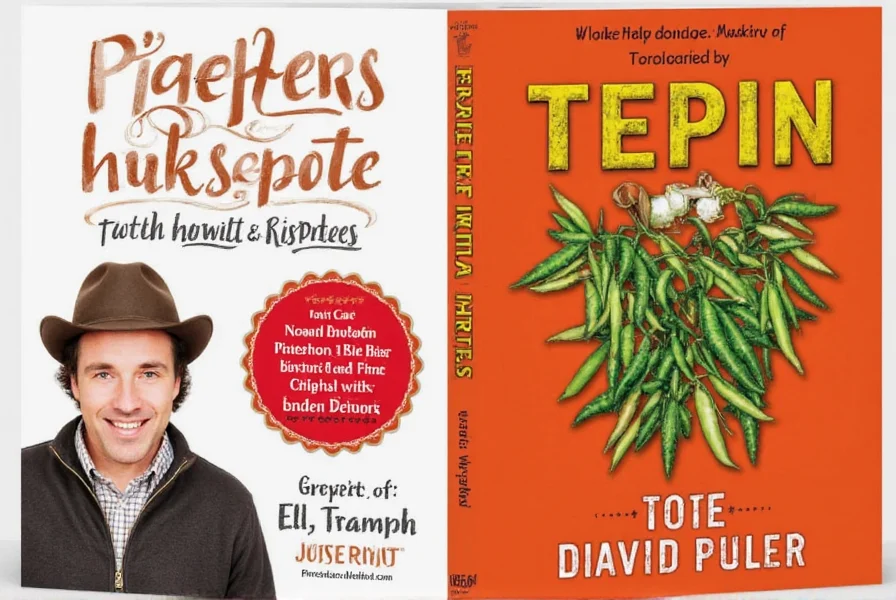Pepper Tepin: Spicy Secrets of the Wild Chile You Can’t Ignore
Table of Contents
- Introduction to Pepper Tepin
- Flavor Profile and Heat Level
- Culinary Uses of Pepper Tepin
- Health Benefits of Eating Tepin Peppers
- Buying Guide: How to Choose the Best Tepin Peppers
- Growing Your Own Pepper Tepin at Home
- Delicious Recipes Featuring Pepper Tepin
- Pepper Tepin vs. Other Hot Peppers: A Visual Comparison
- Final Thoughts
Introduction to Pepper Tepin
The pepper tepin, also known as the Texas chili pepper, is a tiny but fiery wild chile that packs a punch far beyond its size. Native to the southwestern United States and northern Mexico, this pepper has been used for centuries by indigenous peoples in traditional dishes and medicinal practices.
Globally recognized for its intense heat and complex flavor profile, the tepin pepper is often considered one of nature’s most potent spices. Whether you're a home cook looking to spice up your meals or a chef experimenting with new ingredients, this little red firecracker deserves a spot in your spice collection.
Flavor Profile and Heat Level
What makes the pepper tepin so special isn't just its heat—it's the way it dances on your tongue with earthy, smoky, and slightly fruity notes before hitting you with its signature kick.
- Heat Level: Ranges from 30,000–50,000 Scoville units
- Flavor Notes: Smoky, earthy, slightly sweet
- Texture: Small, round, thin-walled
- Color Variants: Green (unripe), orange, red (fully ripe)
Compared to more commonly known chilies like jalapeños or habaneros, the tepin pepper offers a faster, sharper heat that builds quickly and fades smoothly. It’s not just about the burn—it’s about the balance of flavor and spice that makes it stand out among hot peppers.
Culinary Uses of Pepper Tepin
Chefs love using pepper tepin in salsas, sauces, soups, stews, and even desserts—yes, really! Its concentrated heat and aromatic qualities make it perfect for small additions that deliver big impact.
Popular Uses:
- Salsas & Hot Sauces: Add whole or crushed peppers to your homemade blend
- Dried Chiles: Use in rubs or rehydrate for stuffing
- Oils & Vinegars: Infuse with tepin for spicy condiments
- Meat Marinades: Enhance grilled meats with a few pinches of ground tepin
- Beverages: Some craft cocktails include tepin-infused syrups for a surprising twist
Because of their potency, you only need a small amount of tepin pepper to make a difference in your dish. Start with half a pepper and adjust to taste—trust us, you’ll thank yourself later.
Health Benefits of Eating Tepin Peppers
Like many chili peppers, pepper tepin contains capsaicin, the compound responsible for both its heat and its health benefits. Incorporating tepin peppers into your diet can do more than add flavor—it can boost your overall well-being.
Top Health Benefits:
- Pain Relief: Capsaicin is used in topical pain-relief creams
- Metabolism Boost: May increase metabolic rate temporarily
- Heart Health: Contains antioxidants and may improve cholesterol levels
- Digestive Aid: Stimulates digestion and can reduce bloating
- Anti-Inflammatory: Natural anti-inflammatory properties support joint health

Of course, moderation is key—especially if you have a sensitive stomach or aren’t used to spicy foods. Always wear gloves when handling fresh tepin peppers to avoid skin irritation.
Buying Guide: How to Choose the Best Tepin Peppers
Whether you’re shopping at a local farmers' market or ordering dried tepin online, here are some tips to ensure you get the best quality product:
Fresh Peppers
- Look for: Firm, glossy skin; uniform color (red preferred for ripeness)
- Avoid: Wrinkled, soft, or discolored peppers
- Storage: Keep refrigerated in a paper bag for up to a week
Dried Peppers
- Look for: Deep red color, pliable texture
- Avoid: Brittle, overly dry peppers
- Storage: Store in an airtight container away from light
Ground Tepin Powder
- Best For: Seasoning blends, marinades, and sauces
- Quality Tip: Choose organic and non-irradiated powder for best flavor
If you can’t find fresh tepin locally, consider purchasing dried versions or powders from specialty spice shops or reputable online retailers that offer wild-harvested options.
Growing Your Own Pepper Tepin at Home
If you're feeling adventurous, why not try growing your own pepper tepin plants? They’re surprisingly hardy and thrive in warm, arid conditions.
Quick Growing Tips:
- Climate: Zones 9–11 ideal; can be grown indoors in cooler regions
- Sunlight: Full sun (6+ hours daily)
- Soil: Well-draining soil; slightly sandy is fine
- Watering: Moderate—avoid overwatering
- Harvest Time: Begins producing within 80–100 days after planting
Because these plants are perennial, they can come back year after year if protected from frost. They’re also resistant to many common pests and diseases—making them a low-maintenance addition to any garden.
Delicious Recipes Featuring Pepper Tepin
Ready to put those tepin peppers to work? Here are a few simple yet exciting ways to use them in your kitchen:
- Spicy Honey Glazed Wings: Combine tepin powder with honey, garlic, and soy sauce for a sweet-and-spicy glaze
- Smoked Tepin Margarita: Rim the glass with tepin salt and add a splash of tepin-infused agave syrup
- Tex-Mex Stuffed Peppers: Mix ground beef, rice, black beans, and finely chopped tepin peppers
- Wild Tepin Oil: Infuse olive oil with crushed tepin peppers for a spicy finishing touch
- Tequila Lime Sorbet with Tepin Dust: A unique dessert with a spicy surprise
These recipes highlight the versatility of pepper tepin—from savory to sweet, it can elevate almost any dish when used thoughtfully.
Pepper Tepin vs. Other Hot Peppers: A Visual Comparison
| Pepper | Scoville Units | Flavor Profile | Common Uses | Availability |
|---|---|---|---|---|
| Pepper Tepin | 30,000–50,000 | Earthy, smoky, slightly fruity | Salsas, oils, infusions | Moderate (wild or specialty markets) |
| Jalapeño | 2,500–8,000 | Grassy, vegetal | Stuffed peppers, nachos, tacos | Widely available |
| Habanero | 100,000–350,000 | Fruity, floral | Hot sauces, Caribbean cuisine | Specialty stores |
| Ghost Pepper | ~1,000,000 | Smoky, sweet then searing | Challenge eating, super-hot sauces | Limited availability |
| Bird’s Eye Chili | 50,000–100,000 | Grassy, sharp | Thai curries, stir-fries | Asian grocery stores |
Final Thoughts
The pepper tepin may be small, but it’s mighty in both flavor and function. Whether you're a spice enthusiast looking to explore lesser-known chilies or a chef aiming to impress with bold flavors, this wild chile brings a lot to the table—literally and figuratively.
From its rich cultural heritage to its impressive heat and complex taste, there’s no denying the allure of the tepin pepper. With proper handling and creative cooking, you can unlock its full potential and enjoy a truly authentic spice experience.











 浙公网安备
33010002000092号
浙公网安备
33010002000092号 浙B2-20120091-4
浙B2-20120091-4